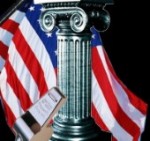 Marti Oakley (c)copyright 2011 All rights Reserved
Marti Oakley (c)copyright 2011 All rights Reserved
__________________________________________
“The 1986 law was passed as a protection to one of the largest contributors to political campaigns. It was a specially designed program that removed the right to enter into state or federal court and to sue for damages as a result of mandatory vaccinations which even in 1986 were known to cause more harm than good. “
_________________________________________
 In what should come as no surprise to anyone who has watched as the Supreme Court routinely renders rulings which are clearly protective of corporate interests, another “opinion”, one clearly meant to protect big pharma from being held even remotely liable for the harm and damage caused by toxic vaccines, was just handed down. In a majority opinion by Justice Antonin Scalia, the court ruled the federal law preempted all design-defect claims against vaccine manufacturers. These would be the design defects that kill people, cause autism, neurological damage and lifetime physical impairment.
In what should come as no surprise to anyone who has watched as the Supreme Court routinely renders rulings which are clearly protective of corporate interests, another “opinion”, one clearly meant to protect big pharma from being held even remotely liable for the harm and damage caused by toxic vaccines, was just handed down. In a majority opinion by Justice Antonin Scalia, the court ruled the federal law preempted all design-defect claims against vaccine manufacturers. These would be the design defects that kill people, cause autism, neurological damage and lifetime physical impairment.
Apparently Justice Scalia is unaware that no law can be enacted which abrogates your individual rights. Any law that attempts to deprive you of your rights is null and void on its face as if it had never been. Actually, Scalia doesn’t really care and has routinely issued opinions that are written as if he is living in some other universe where he makes up his own laws and then decides they are real.
“Within limits of practicability, a state must afford to all individuals a meaningful opportunity to be heard. . .Whenever one is assailed in his person or his property, there he may defend. . .The right to meaningful opportunity to be heard within limits of practicality must be protected against denial by particular laws that operate to jeopardize it for particular individuals”. Boddie v. Connecticut, 92, S.Ct. 780, 401 U.S. 371. 28 L.Ed.2d 113 conformed t 329 F. Supp. 844 (1971)
The practicality mentioned in this ruling was not meant to be construed to “its more practical to create a fictional court to divert you from your rights, than to hold these manufacturers liable for the harm they cause”. This was protectionism, and nothing less. This was the abuse of the legal system and the judiciary to benefit corporate benefactors.
What SCOTUS has in effect done is to deprive individuals who have been harmed by the negligence and profiteering of vaccine manufacturers, of their rights to due process: their right to enter into a state or federal court to make their claims for injury and declaring the rights to profits of the corporation to be of more importance than the human being. There is no Constitutional provision for setting up special courts outside the established judiciary.
It is apparently unthinkable that the manufacturers of these deadly concoctions be held accountable for the deadly after effects of their products, launched into the public market with the blessings of FDA and the AMA and several world organizations. Never mind that people are being harmed or killed; there are profits to be made and SCOTUS is prepared to make sure nothing interferes with those anticipated profits.
Having been relieved of any liability to any degree under the creation of the Vaccine Court and the National Childhood Vaccine Injury Act of 1986, the Vaccine Kangaroo Court serves to discount, discredit, and dismiss claims for injuries. While claiming they have paid out $1.8 billion in vaccine injury claims in less than 2,500 cases since 1989, every dime of those payouts is paid by the tax on the vaccines themselves; A user tax created specifically to make sure the manufacturer is never financially liable and a tax that most consumers were not even aware was being applied to the vaccine. In the meantime, the public was led to believe that claims in the Vaccine Kangaroo Court were being paid by the vaccine manufacturers.
The 1986 law was passed as a protection to one of the largest contributors to political campaigns. It was a specially designed program that removed the right to enter into state or federal court and to sue for damages as a result of mandatory vaccinations which even in 1986 were known to cause more harm than good. In fact it is because the death toll and lifetime injury caused by vaccines was rising so rapidly, that the 1986 Congress moved to protect the manufacturers.
The rationale of the current court and the Congress in 1986 is that allowing people to seek damages might make the vaccine manufacturers reduce their stockpiles of deadly products. We could only hope. It is apparently the opinion of the Court that profits are far more imperative than protecting the public from, and holding the manufacturers accountable for, harm and physical/mental damage or even death. If manufacturers were held liable and accountable it could destabilize the supply of deadly vaccines. If their unfettered profits might be threatened, manufacturers would stop producing vaccines.
From:Science blogs.com ruled 6-2 against the plaintiffs:
The justices, voting 6-2, said a 1986 federal law preempts claims that a drugmaker should have sold a safer formulation of a vaccine. The law, designed to encourage vaccine production by limiting patient suits, channels most complaints into a company- financed no-fault system that offers limited but guaranteed payments for injuries shown to be caused by a product.
“The vaccine manufacturers fund from their sales an informal, efficient compensation program for vaccine injuries,” Justice Antonin Scalia wrote for the majority. “In exchange they avoid costly tort litigation and the occasional disproportionate jury verdict.”
The ruling is a victory for the four companies that supply vaccines for the U.S. market — Wyeth, GlaxoSmithKline Plc, Merck & Co. and Sanofi-Aventis SA. A ruling letting the parents sue Wyeth might have allowed suits by thousands of families that say vaccines caused autism in their children. Since 1988, the no-fault process has led to almost $2 billion in compensation to more than 2,500 families.
The issue for the Supreme Court was whether the 1986 law leaves open the possibility that patients can sue manufacturers when the side effects were avoidable. The Obama administration joined Wyeth, acquired in 2009 by New York-based Pfizer, in urging the justices to bar those kinds of suits.
Far from being simply a “no-fault” process, the Vaccine Kangaroo Court is simply a processing center where legitimate cases are dismissed to control the funds being paid out. It also serves to artificially skew the statistics reported by CDC and the other organizations who present these statistics to the public. No report ever mentions the true number of cases or the specific causes for those cases, and even the CDC has had to admit that in all probability, only 1 in 10 cases of adverse events reporting is ever made.
Why this Court and even our President thought it necessary to abrogate the rights of injured party’s, was even necessary, is beyond me. After all, the vaccine manufacturers weren’t paying any of these claims anyway as Scalia mistakenly claimed. What possible danger could they have been in?
I suppose we can all rest peacefully knowing the protection racket within our government is in full force.
________________________
Bruesewitz v. Wyeth, 09-152 Case that was ruled on.
“The judicial branch has only one duty — to lay the article of the Constitution which is involved beside the statue which is challenged and to decide whether the latter squares with the former. . .the only power it (the Court) has. . .is the power of judgement.” U.S. v. Butler, 297 US (1936)
”
“Judges may be punished criminally for willful deprivation of rights on the strength of Title 18 U.S.A. 241 and 242.” Imbler v. Pachtman, 424 U.S. 409; 96 S.Ct. 984 (1976)
“Legislative acts, no matter what their form, that apply either to named individuals or to easily ascertainable members of a group in such a way as to inflict punishment on them without a judicial trial are bills of attainder prohibited by the Constitution.” United States v. Brown. 381 U.S. 303, 66 S.Ct. 1073 (1946)
A state cannot foreclose the exercise of constitutional rights by mere labels. Bigelow v. Virginia, 95 S.Ct. 2222, 421 U.S. 809 (1975
In pursuing substantial state interest, state cannot choose means which unnecessarily burden or restrict constitutionally protected activity. Dunn v. Blumstein, 92 S.Ct. 995, 405 U.S. 330 (1972)
Quite apart from the guarantee of equal protection, if a law impinges on a fundamental right explicitly or implicitly secured by the Constitution it is presumptively unconstitutional. Harris v. McRae, 100 S.Ct. 2671, 448 U.S. 297, 65 L.Ed.2d 784,rehearing denied 101 S.Ct. 39, 448 U.S. 917, 65 L.Ed.2d 1180 (1980)














Minnesota: MDH to add more deadly vaccines to childhood burden | The PPJ Gazette
May 11, 2013 @ 01:01:33
Vaccines: Big Pharma’s ATM « The PPJ Gazette
Feb 29, 2012 @ 20:09:36
World Spinner
Mar 03, 2011 @ 21:24:38
Vaccine Epidemic’s new book flies from the shelf « Case About Bird Flu
Mar 02, 2011 @ 17:40:46
Feb 28, 2011 @ 23:38:36
Actually, it was the 1986 law, not the 1968 law. A case could be made that it was not Congress’ intention to shield vaccine-manufacturer’s with this law, although that was the outcome.
Is anyone surprised at the Supreme Court’s ruling? We are OWNED by Pharma and their bought representatives in the various ruling-bodies throughout the land.
It’s long past time to ‘go Wisconsin’ on all our sold-out ‘reps’.
Please see Martin Walker’s wonderful works:
The Complainant Brian Deer, the ABPI, Medico Legal Investigations and Dr Andrew Wakefield
http://www.whale.to/vaccine/walker999.html
and:
The Ghost Lobby
http://www.whale.to/b/walker1.html
on conditions in the U.K. and, by extension, North America
LikeLike